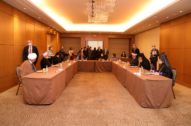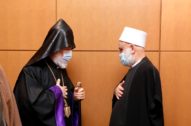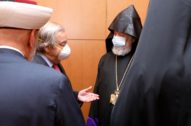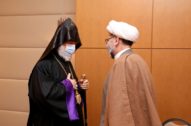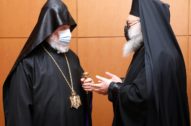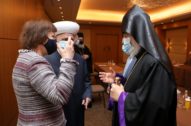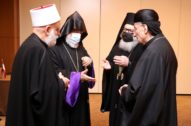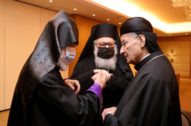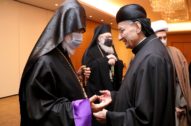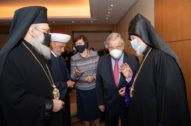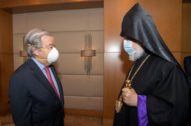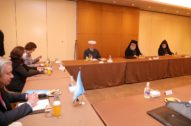Yesterday a meeting took place between the General Secretary of the United Nations, H.E. Antonio Guterres and the heads of the six major Christian and Muslim communities of Lebanon: His Beatitude Patriarch Bechara Boutros Rahi, Maronite Patriarch of Antioch and Head of the Maronite Church; His Eminence Abdul Latif Derian, Sunni Grand Mufti; Judge Sheikh Mahdi El-Yahfoufi representing His Eminence Sheikh Ali Al-Khatib, Deputy Head of the Higher Islamic Shiite Council; His Beatitude Patriarch John X Yaziji, Patriarch of Antioch for the Greek Orthodox Church; His Eminence Sheikh Sami Abil Mona, Druze Sheikh Aql and Head of the Druze Unitarian Council; and His Holiness Catholicos Aram I, Head of the Catholicosate of Cilicia of the Armenian Orthodox Church.
In a closed session, the spiritual leaders shared their views, concerns, and expectations with the General Secretary pertaining the situation in Lebanon. In his intervention, His Holiness Aram I said: You have come to Lebanon with one simple message: the UN stands with the people of Lebanon. Our message to you is a simple one too: help us, Lebanon is dying.
Referring to the crisis in Lebanon, H.H. Aram I said that usually we deal with symptoms of crises we face; we must address their root-causes. The crises of Lebanon in my judgment, have three main causes, and these are: the system of governance, those who govern, and concept of state.
H.H. Aram I briefly described these points. –
a) The community system which reflects the diversity is both the richness and vulnerability of Lebanon. Preserving the diversity, which ensure the specific identity of Lebanon, how can we set a system which is democratic, equitable, accountable, and participatory? In my view, a decentralized system could be a reasonable and feasible option. b) Those who are elected to govern the country should exercise their responsibility according to a code of ethics that stresses accountability, transparency, and rule of law. c) We have almost lost the concept of state which entails central authority and rule of law.
Speaking about the role of the UN, H.H. Aram I said that it could include the following inter-related dimensions with both short-term and long-term actions: a) Appealing to the international community and donor agencies to help Lebanon particularly in the spheres of humanitarian aid, social assistance, health care, and education. b) Urging the government of Lebanon to initiate a serious reformation process, organize election, and make function the state institutions to respond to the basic needs of people. c) Challenging the friends of Lebanon to help Lebanon to heal its wounds, recover its economic stability, and re-assume its political role in the international community.
In his concluding remarks, His Holiness said that the role of the UN is mainly one of reminding, urging, facilitating, challenging, assisting; it must also become one of warning when the necessity requires. The UN must remind the international community that Lebanon, with its human, cultural, and economic resources, and as a country of religious, cultural, and ethnic co-existence, can bring a unique contribution to the world civilization. It must as well as warn the international community that a de-stabilized Lebanon may have far-reaching disastrous consequences. It is therefore expected that the solidarity of UN with Lebanon become action-oriented solidarity.



